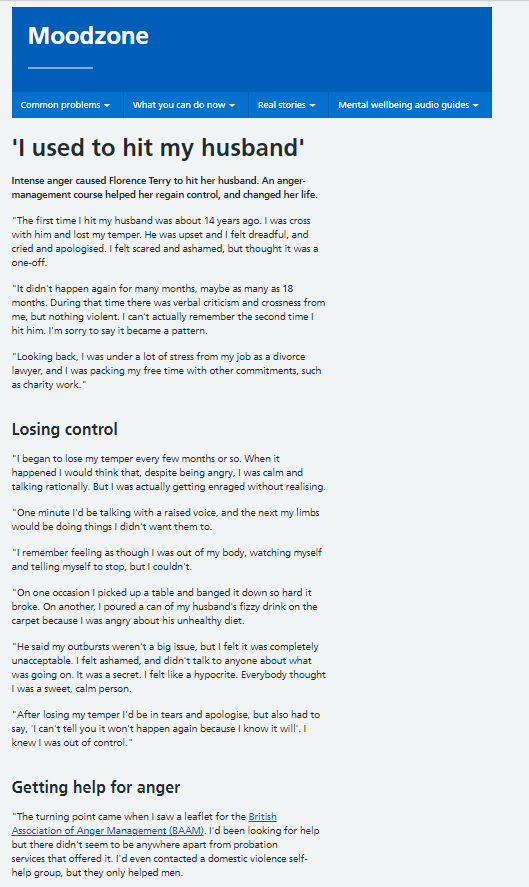<< Back to Stop Seing Red in the Media
I used to hit my husband!
Florence Terry is interviewed for the NHS and explains how she sought help.
Intense anger caused Florence Terry to hit her husband. An anger-management course helped her regain control, and changed her life.

“The first time I hit my husband was about 14 years ago. I was cross with him and lost my temper. He was upset and I felt dreadful, and cried and apologised. I felt scared and ashamed, but thought it was a one-off.
“It didn’t happen again for many months, maybe as many as 18 months. During that time there was verbal criticism and crossness from me, but nothing violent. I can’t actually remember the second time I hit him. I’m sorry to say it became a pattern.
“Looking back, I was under a lot of stress from my job as a divorce lawyer, and I was packing my free time with other commitments, such as charity work.”
Losing control
“I began to lose my temper every few months or so. When it happened I would think that, despite being angry, I was calm and talking rationally. But I was actually getting enraged without realising.
“One minute I’d be talking with a raised voice, and the next my limbs would be doing things I didn’t want them to.
“I remember feeling as though I was out of my body, watching myself and telling myself to stop, but I couldn’t.
“On one occasion I picked up a table and banged it down so hard it broke. On another, I poured a can of my husband’s fizzy drink on the carpet because I was angry about his unhealthy diet.
“He said my outbursts weren’t a big issue, but I felt it was completely unacceptable. I felt ashamed, and didn’t talk to anyone about what was going on. It was a secret. I felt like a hypocrite. Everybody thought I was a sweet, calm person.
“After losing my temper I’d be in tears and apologise, but also had to say, ‘I can’t tell you it won’t happen again because I know it will’. I knew I was out of control.”
Getting help for anger
“The turning point came when I saw a leaflet for the British Association of Anger Management (BAAM). I’d been looking for help but there didn’t seem to be anywhere apart from probation services that offered it. I’d even contacted a domestic violence self-help group, but they only helped men.
“I enrolled on a weekend course called Beating Anger, run by BAAM. There were about 15 other people on the course. I was scared at first, but it really helped me. I realised I wasn’t alone, and I learnt that angry behaviour is a physical response you can control.
Recognising the warning signs
“I had thought that I went straight from talking to hitting, but there is an escalation from one to the other, and if you recognise the warning signs you can back off.
“For me, the warning sign is my heart beating faster. When I feel this, I know I need to leave the room.
“After the course I was able to say to my husband, ‘I am sorry, and it won’t happen again’.
“It did happen again, two years after the course. I got over-confident and thought I could control my anger without backing off, even though I felt my heart beating faster. Suddenly my hand was striking his cheek.
“It hasn’t happened since. I get angry less often now, and much less angry when I do.”
Making some life changes
“The course also helped me look at other areas of my life, such as work and looking after myself.
“I decided to make fewer commitments in my free time, and I also pay more attention to eating healthily. I avoid having a lot of caffeine as it can make me agitated.
“The course raised some issues about my childhood, and therapy has been really effective in helping me deal with that.
“A key issue for me is sleep. My husband used to come to bed later than me and I’d wake up, which left me tired and annoyed, so I now often sleep in another room. It sounds odd to some people, not to sleep in the same bed every night, but it works well for us.
“I realised work was putting a lot of stress on me, and I’m now self-employed. I still work in law, but I also work in mediation and run anger management courses. It’s challenging, but makes me deeply happy to see other people gain control of their anger.
“I’m passionate about helping people learn how to deal with anger and conflict. If I had found the course earlier I’d have been saved so much pain.”
How Florence is doing now
Florence recently provided the following update:
“The words above were written about nine years ago.
“If I were to write them again now, I would make a far more direct link between getting help for managing my anger and making life changes.
“What I learned during anger management wasn’t just how to stop being aggressive when I am angry. It was also the key to understanding that anger (the feeling of anger, not aggressive behaviour) is my friend. It’s a sign that something is wrong.
“During the last nine years, with the help of therapy and friends, I’ve been paying attention to my feelings of anger. These feelings alert me to the fact that something in my life isn’t good for me and have helped me to continue making changes.
“Those changes have been both internal – such as not taking things personally and not getting caught up in unhelpful self-talk –and external, such as ending friendships that were unsupportive or not working well.
“As I’ve changed, my wellbeing has improved and I have much more resilience to deal with things I can’t change. I need much less sleep, and I’m contented in a way I didn’t know was possible.”
Florence continues to offer anger management to people struggling to control their tempers, including those who take their anger out on themselves.
For more information about Florence’s work, see the Stop Seeing Red website.









